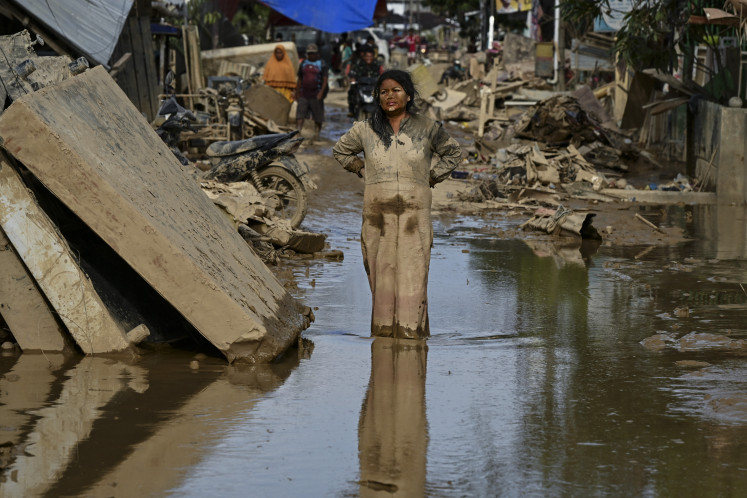Popular Reads
Top Results
Can't find what you're looking for?
View all search resultsPopular Reads
Top Results
Can't find what you're looking for?
View all search resultsMalaysia should demolish lighthouse at Tanjung Datuk
Malaysia began construction of a lighthouse in the sea off Tanjung Datuk Island in West Kalimantan
Change text size
Gift Premium Articles
to Anyone
M
alaysia began construction of a lighthouse in the sea off Tanjung Datuk Island in West Kalimantan. Indonesian authorities sent to monitor the situation reported the presence of a number of Malaysian ships, including one war ship.
Currently Malaysia has ceased construction after Indonesia sent a diplomatic note to protest the activity, but some of the fixtures of the lighthouse have not yet been demolished.
The question is whether Malaysia has the right to erect a lighthouse in the area it recognizes as part of Indonesia's continental shelf? The shelf was agreed upon by the two countries based on the agreement on the delimitation of continental shelves of Oct. 27, 1969.
According to Article 80 of the United Nations Convention on the Law of the Sea (UNCLOS), to which Indonesia and Malaysia are party, a state having a continental shelf has the exclusive right to construct and authorize and regulate the construction, operation and use of, among other things, certain installations and structures.
This means Malaysia does not have the right to construct such lighthouse. Or if Malaysia wanted to construct the facility, it needs the consent of Indonesia.
But of course Malaysia will argue that the construction is beyond Indonesia's continental shelf.
If that is the case, there is a set of questions for such an argument. First, why is Malaysia constructing a lighthouse in an area where it must have known that it would be objected by Indonesia? Not only is it objected by Indonesia, but most importantly, by the public.
Second, if the lighthouse is for the purpose of navigation safety why is it only now being constructed? Why not long time ago?
Many in Indonesia question the construction is for the very purpose of navigation safety. There are perhaps other motives behind the project. It has to be kept in mind that for navigation safety Indonesia and Malaysia have constructed a number of lighthouses in the vicinity.
The last question is has Malaysia failed to look at the Continental Shelves Agreement with Indonesia carefully prior to the construction? Or at least why has Malaysia not consulted Indonesia on its intention to construct the lighthouse in the spirit of ASEAN?
Learning from past experiences, the Malaysian government should have been more sensitive when dealing with Indonesia on border issues. If Malaysia disregards the sensitivity, it will trigger tension that will sacrifice relations between the two neighbors.
If Malaysia is committed to and practicing a good neighbor policy, implementing the ASEAN spirit of non-provocation, it would want to preserve the good relations with Indonesia. Malaysia should by itself demolish the current lighthouse fixtures. Halting the construction is far from enough.
If Malaysia insists that the location of the lighthouse is part of its territory, then a joint survey between the two countries can be conducted. But this can materialize only after Malaysia demolishes the constructed fixtures.
Why is it so important to demolish the construction fixtures? There are at least three reasons.
First, to tame the public uproar in Indonesia, in particular people in West Kalimantan. For them the lighthouse is seen as a symbol of Malaysian arrogance.
Second, if the Malaysian government does not act swiftly to demolish the fixtures, public pressure will be mounting on President Susilo Bambang Yudhoyono to take sterner actions against Malaysia. At the end, this may complicate and worsen the handing of the bilateral issue.
Lastly, since the presidential election in Indonesia is approaching, the fixture will be prone to exploitation by candidates as a political commodity. The two presidential candidates may take up the issue to say that the current government is weak when it comes to Malaysia's provocation. The two, in order to get votes from the people, will say that once elected, tougher measures against Malaysia will be taken.
Once elected, the new president may fulfill his promise to get tough with Malaysia. Although it may not be reminiscent of the past confrontation policy, of course strained relations will not benefit the two countries.
In handling the current issue Malaysia, in particular, should put good neighborly action behind its construction of a lighthouse for navigation safety or any other reason.
_______________
The writer is a professor of international law at the University of Indonesia, Depok, West Java.










